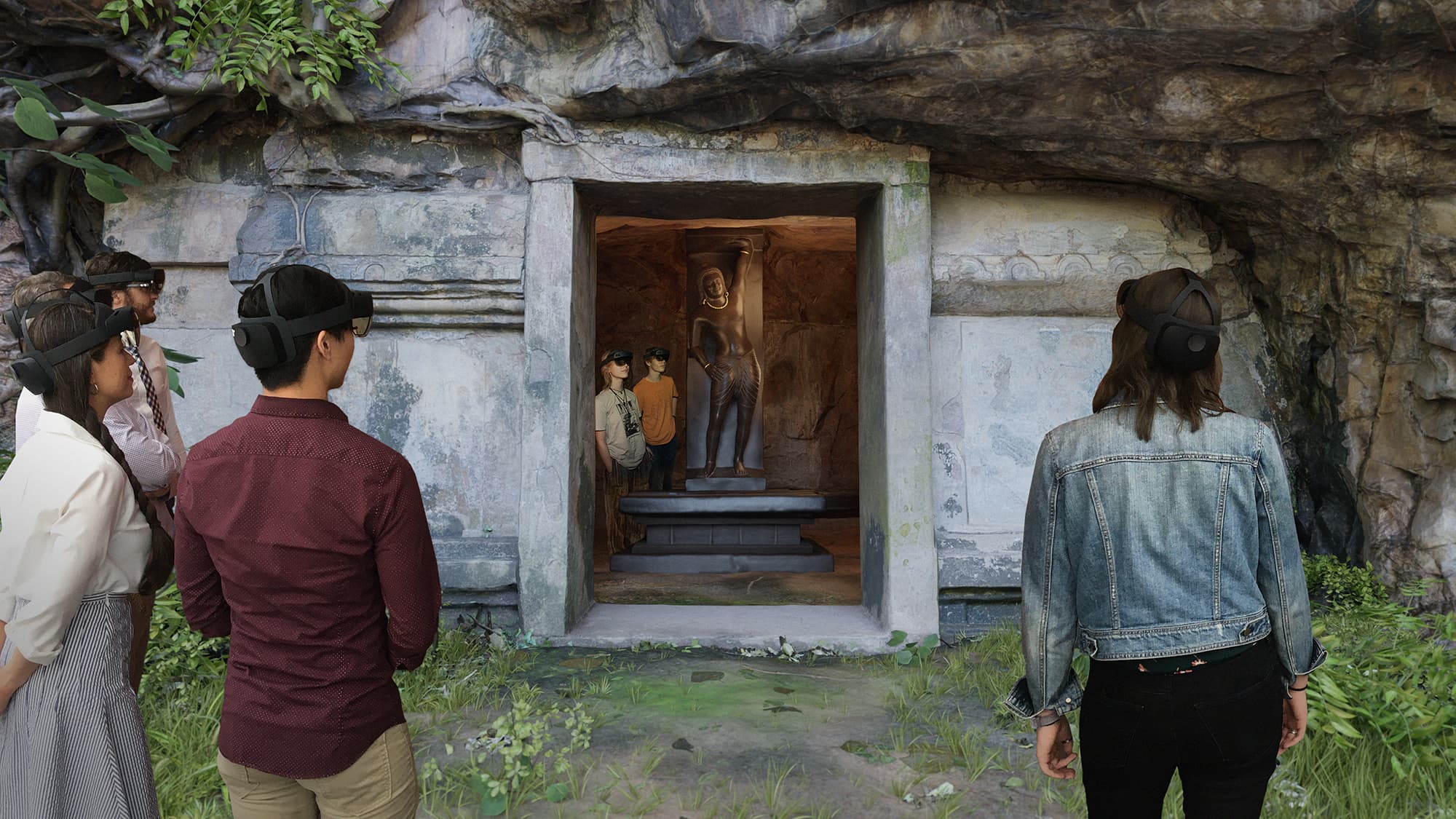Visions and Revisions: Behind the Scenes of Revealing Krishna
- Special Event
Suzanne and Paul Westlake Performing Arts Center

About The Event
This event is in the past. Watch the recorded program below.
Science, innovation, and digital technologies were integral to the development of the unprecedented exhibition Revealing Krishna: Journey to Cambodia’s Sacred Mountain at the Cleveland Museum of Art.
Hear how curators, conservators, engineers, physicists, materials scientists, and leaders in the field of technology and digital imaging worked together to understand and convey the form, history, and context of the museum’s monumental sandstone sculpture Krishna Lifting Mount Govardhan.
Conservator Beth Edelstein and digital prototyping director Ainsley Buckner of Sears think[box] at Case Western Reserve University (CWRU) discuss how 3-D modeling and printing of the sculpture were used in the conservation process. Curator Sonya Rhie Mace and digital modeling specialist Dale Utt III share how they worked together using 3-D models to digitally reconstruct the image of the Cleveland Krishna and virtually install it in its original cave sanctuary. Jane Alexander, chief digital information officer, and Mark Griswold, CWRU professor of radiology, detail how digital innovations, including high-resolution holograms, allow visitors to effectively experience the sculpture’s story.
Free; in-person tickets required. Due to unforseen circumstances this program will not be available virtually live. A recorded program will be available online for virtual viewing.
Speakers:
Beth Edelstein, Objects Conservator, The Cleveland Museum of Art
Ainsley Buckner (opens in a new tab), Director of Prototyping, Art, and Community Engagement at Sears think[box], Case Western Reserve University
Sonya Rhie Mace, George P. Bickford Curator of Indian and Southeast Asian Art, The Cleveland Museum of Art
Dale Utt III (opens in a new tab), Digital Artist, Owner, True Edge Archive
Jane Alexander, Chief Digital Information Officer, The Cleveland Museum of Art
Mark Griswold (opens in a new tab), Faculty Director at the Interactive Commons, The Pavey Family Designated Professor of Innovative Imaging, and Professor of Radiology, Case Western Reserve University
The exhibition is organized in cooperation with the Ministry of Culture and Fine Arts of the Government of the Kingdom of Cambodia and in collaboration with the National Museum of Cambodia, the École française d’Extrême-Orient, and the Musée national des arts asiatiques–Guimet.




Principal support is provided by Rebecca and Irad Carmi, Mary Lynn Durham and William Roj, and the Rajadhyaksha Family and DLZ Corporation. Major support is provided by Raj and Karen Aggarwal, the E. Rhodes and Leona B. Carpenter Foundation, and the Eugene V. and Clare E. Thaw Charitable Trust. Additional support is provided by DLR Group | Westlake Reed Leskosky, Carl T. Jagatich, the John D. Proctor Foundation, Mr. and Mrs. Paul E. Westlake Jr., and in memory of Dr. Norman Zaworski, MD. Generous support is provided by Dr. Michael and Mrs. Catherine Keith.

The Official Technology Partner is Microsoft.

This exhibition is supported in part by the National Endowment for the Arts.

“The Story of the Cleveland Krishna” HoloLens Experience was developed in collaboration with the mixed-reality development partner the Interactive Commons at Case Western Reserve University.

All exhibitions at the Cleveland Museum of Art are underwritten by the CMA Fund for Exhibitions. Generous annual support is provided by an anonymous supporter, Dr. Ben H. and Julia Brouhard, Mr. and Mrs. Walter R. Chapman Jr., the Jeffery Wallace Ellis Trust in memory of Lloyd H. Ellis Jr., Janice Hammond and Edward Hemmelgarn, Eva and Rudolf Linnebach, William S. and Margaret F. Lipscomb, Tim O’Brien and Breck Platner, Anne H. Weil, and the Womens Council of the Cleveland Museum of Art.
We recognize Dr. Gregory M. Videtic and Mr. Christopher R. McCann, who are graciously linked to this exhibition through the Leadership Circle.
The restoration of Krishna Lifting Mount Govardhan, expertly undertaken by Cleveland Museum of Art conservation specialists, was funded by a grant from the Bank of America Art Conservation Project.